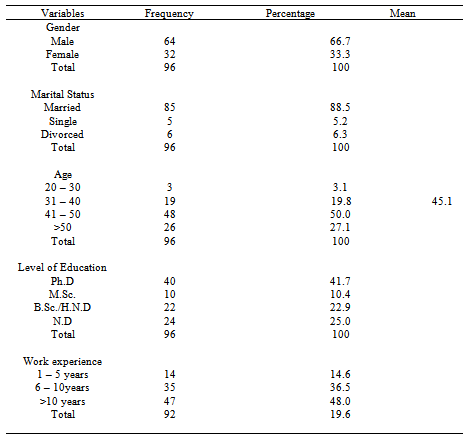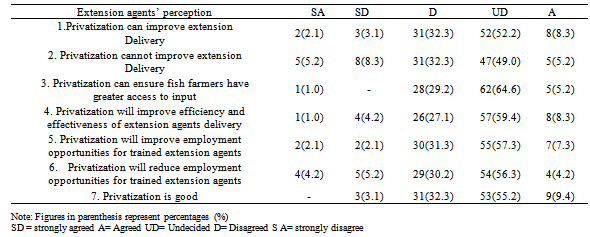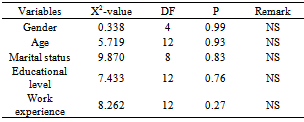-
Paper Information
- Next Paper
- Previous Paper
- Paper Submission
-
Journal Information
- About This Journal
- Editorial Board
- Current Issue
- Archive
- Author Guidelines
- Contact Us
Resources and Environment
p-ISSN: 2163-2618 e-ISSN: 2163-2634
2013; 3(4): 87-90
doi:10.5923/j.re.20130304.05
Perception of Agricultural Extension Agents on the Privatization of Service Delivery towards the Rural Fish Farmers in Ondo State, Nigeria
J. B. Ogunremi1, S. O. Olatunji2
1Department of Biological Sciences Ondo State University of Science and Technology, Okitipupa, Nigeria
2Department of Agricultural Economics and Extension, University of Port Harcourt, Port Harcourt, Nigeria
Correspondence to: J. B. Ogunremi, Department of Biological Sciences Ondo State University of Science and Technology, Okitipupa, Nigeria.
| Email: |  |
Copyright © 2012 Scientific & Academic Publishing. All Rights Reserved.
The withdrawal of the World Bank sponsorship of agricultural development programmes (ADP) in Nigeria and the decline in both the funding and overall organization and administration of extension has posed a great challenge as regards effective means of funding extension delivery, privatization of extension service delivery has been considered lately as the only option. The study therefore examined the perception of agricultural extension agents on the privatization of services delivery towards the fish farmers. The study was carried out in Ondo State, Nigeria. Sample size of 92 respondents (extension agents) from the Ondo State Agricultural Development Project (ODSADP) was used in the study. Data for the study were collected through the use of structured questionnaire. Data were analyzed using frequency counts, percentage, mean score, and Chi-square. Most of the respondents (66.7%) were male, mean age of 45.1 years, 88.5% were married and 41.7% had Ph.D as the highest educational qualification, while the average working experience of the respondents was10 years. Also, 64.6% of the respondents agreed that the privatization can ensure fish farmers have greater access to fishing inputs, 59.4% agreed that privatization will improve efficiency and effectiveness of extension agents while 57.3% agreed that privatization will improve employment opportunities for trained extension personnel. Personal characteristics of extension agents and their perception on privatization of service delivery towards rural fish farmers are not significant (P >0.05). The study concludes that issues on privatization of extension should therefore be given adequate consideration by policy makers, stakeholders in extension service delivery and the government before final decision is taken on whether or not to privatize agricultural extension services in the State.
Keywords: Extension Agents, Fish Farmers, Services, Perception, Privatization
Cite this paper: J. B. Ogunremi, S. O. Olatunji, Perception of Agricultural Extension Agents on the Privatization of Service Delivery towards the Rural Fish Farmers in Ondo State, Nigeria, Resources and Environment, Vol. 3 No. 4, 2013, pp. 87-90. doi: 10.5923/j.re.20130304.05.
Article Outline
1. Introduction
- Agricultural Extension refers to an education system that provides farmers with technical advice required to increase farm output and income including advice on credit, other inputs and marketing. It also provides research institutes and credit institutions information about farmer’s conditions[9] The role played by extension service in every sector of agricultural production cannot be over emphasized; for the prominent role it plays in dissemination of vital agricultural information. The responsibility of making farmers aware of research findings to increase their production is that of extension service providers. From government perspectives, whatever priority is given to agricultural production extension will remain a key policy tool for promoting ecologically and socially sustainable farming practices[20]Privatization involves ending of total or substantial ownership and operational control from the government to the private sector. It also involves the development of new partnerships and association capacities between government agencies and non governmental and private sectors[11]The World Bank component of the tripartite funding arrangement (with Federal and state Governments) for the ADPs in Nigeria ceased in 1995. Most of the ADPs have been unable to cope with their primary responsibilities of providing agricultural extension services in their domain. Many of them have developed coping strategies such as staff reduction, irregular Monthly Technology Review Meetings (MTRM), forth night training (FNT), and are still unable to cope[16]. In Nigeria, agricultural extension services are provided free of charge by the government through the Ministries of Agriculture[4][7] observed that “despite the fact that public financing for extension is often justifiable, the general trend towards fiscal restraint and a reduced role for the public sector has led to financial crisis in many extension services”. Since the 1990s, inadequate funding has led to the virtually collapse of research and extension institutions that provided services small farmers and rural communities in Nigeria[18] Agricultural Extension requires billions of Naira for its operations, which can no more adequately delivered by the Federal or State Governments. Governments have found that they are less able to continue providing all the sevices previously provided. There has been a call for private sector involvement in the provisions of extension services as a result of government’s dwindling development budgets and extremely poor progress in rising economic and social well being of the populace through public extension services[6]. Privatization is based on the assumption that there is relevant technology to disseminate because if there happens not to be any, a change in service provider can do nothing to increase the effectiveness of extension[13]. It is therefore obvious that financial capability to pursue extension activities when external funding has come to an end is a problem. Government has therefore realized that they are less able to continue providing all the extension services expected of them as a result of financial limitations[2],[8]. Agricultural extension still remain the most crucial and critical means to reach farming households in the rural areas and globally[1]. In reaction to the worrisome performance of the agricultural sector, the Federal Government has embarked on various programmes and schemes aimed at returning the sector to its enviable position in the Nigerian economy[5]. There are changing trends and challenges facing agricultural extension delivery in Nigeria which has necessitated the growing campaign for increase in private participation and funding[14]. The decline of government in funding the agricultural sub sector affected the extension services which used to be effective in carrying of innovation to farmers to improve their level of agricultural production; there is urgent need to stem this dangerous tide[19],[3] and[12]. The major lessons learned from the past extension programmes in Nigeria is that it is not possible for government alone to support extension programme in all its ramifications. The private sector needs to play a more active role in both funding and physical transfer of the available improved technologies[15 and 18]. There is agitation for privatization of extension services as done in developed Countries. Advocates of private extension services believe that it improves efficiency, improves public finance and encourages competition and private sector participation[1]. However the adoption of privatization of extension services to fish farmers is expected to call for agitation from these services provider which are the extension agents. As a result of this problem this study sought the opinion of Agricultural Extension Agents on the Privatization of service delivery towards the Fish Farmers in Ondo State, Nigeria.
2. Methodology
- The study was carried out in Ondo State, Nigeria. The state has two Agricultural zones, namely I and II. A list of Extension agents in the two zones was obtained from the state headquarters of the Agricultural Development Programme (ADP). Random sampling was used in selecting ninety six extension agents from the list of 128 extension agents from the two zones. The data were collected by means of questionnaire, and data collected were analysed by the use of frequency, percentages, means and Chi-square.
3. Results and Discussion
- Table 1 shows that 66.7% and 88.5% were male and married extension agents respectively[17] reported higher percentage of male and married. The mean age of extension agents was 45.10; it implies that extension agents were in their middle ages. This trend is of great importance as elderly people are believed to have a good perception of issues and its implications. About 42 percent of the agents had Ph.D, 10.4% had BSc. while only 22.9% had HND. The result shows that there is need for frequent in- service training in order to upgrade the extension practitioners’ knowledge and skills for effective performance especially in interpretation and comprehension of research. Forty eight percent of the agents had spent at least 10 years in service. It is assumed that the perception of the extension agents was bore out of their years of experience.Table 2 presents the extension agents’ perception towards privatization of extension services to fish farmer. Majority (54.2%) of them agreed that privatization will improve extension delivery, while 49.0% of them agreed that privatization cannot improve extension delivery, 64.6% of the respondents agreed that the privatization can ensure fish farmers have greater access to fishing inputs also, 59.4% agreed that privatization will improve efficiency and effectiveness of extension agents, 57.3% agreed that privatization will improve employment opportunities for trained extension personnel, 55.2% agreed that privatization is good while 5.2% disagreed that privatization will reduce employment opportunity for extension agents. In a similar study,[8] reported high number of respondents that disagreed that privatization will decrease employment opportunities for extension agents. It implies that the extension agents are well disposed to privatization of extension services to fish farmers as against the general believe that privatization should not be encouraged in public agencies. Privatization of extension will be effective if there are well trained personnel who are willing and able to respond to farmers’ requirements; considerable public sector investment in education and training[10].
|
|
|
4. Conclusions and Recommendations
- The study concludes that privatization is becoming a widely accepted organizational change and response that can offer alternative opportunities for efficiency, effectiveness and sustainability in extension service delivery. Policy formulation and implementation by the government on agricultural extension should be a collaborative effort involving all stake holders. It should also include the operational linkages and partnership between extension, fish farmers and other relevant service institutions such as related to research and information technology. In so doing, there is the tendency of achieving higher productivity in fisheries sub-sector in the country.
 Abstract
Abstract Reference
Reference Full-Text PDF
Full-Text PDF Full-text HTML
Full-text HTML

